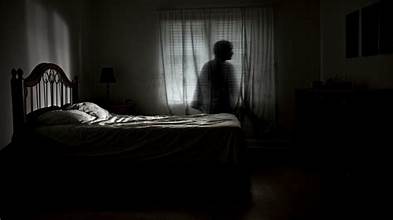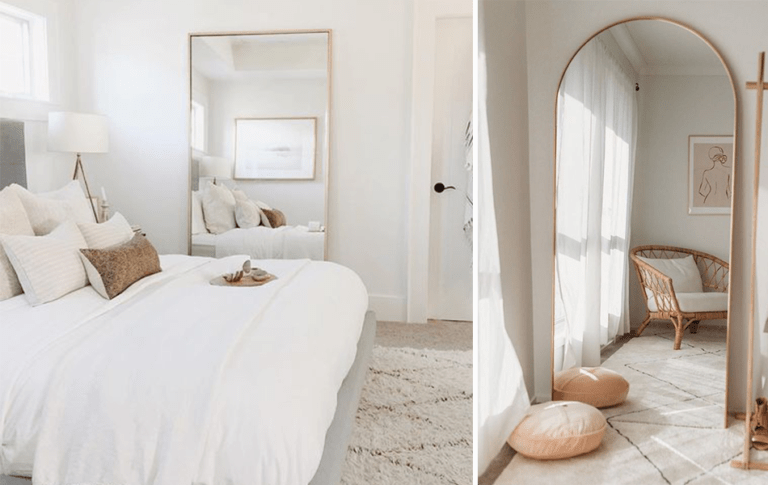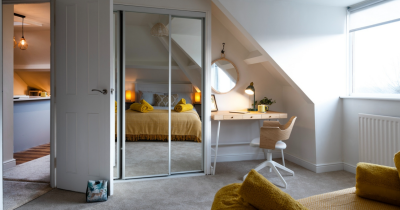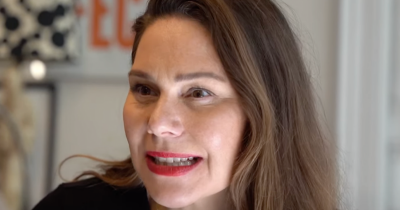Why You Should Never Sleep With a Mirror Facing Your Bed
By fypfeed| Community | 11 August 2025
Mirrors are beautiful objects as well as practicality. They are a fixture in our rooms, line the walls of shops and are found in rooms in hotels. They assist us in getting ready to face the world, reflect sunlight and increase the perception of space within the room. However, throughout history mirrors have been associated with the stigma of being spooky, and are often connected to folklore, religion as well as the paranormal.
Leah, psychic medium as well as a demonologist, who offers advice to thousands of her followers via TikTok and has recently rekindled this discussion. In her viral video she cautions against a particular arrangement that could bring more than just a harmless reflection in your bedroom. sleeping by putting a mirror directly in front of the bed.
“I don’t think I can actually stress this enough to people,” Leah stated. “Do not put an open-air mirror in your bedroom. There will be spirits that aren’t welcome… beings which aren’t exactly attractive.”




Her uncompromising message is in line with a long tradition of warnings against mirrors. Although some view mirrors as gateways or entrances some see mirrors as vessels to hold and replay energy–good or negative. If your beliefs are in the supernatural or simply believe in the power of symbolism Leah’s words have ignited an even larger debate: should we be concerned about where mirrors we have in our homes?
A Long History of Mirror Superstitions
Mirrors and mirrors have been around for centuries. They aren’t new. Different cultures around the globe have believed in the mystical properties of reflective surfaces for ages.
- The history of HTML0 dates back to the time of Rome: Breaking a mirror was believed to bring seven years of bad luck. It’s an old-fashioned belief that persists to this day. The logic was based on an ancient Roman faith that the soul renews itself each seven years. A broken mirror symbolized the broken soul.
- China and Feng Shui: In traditional Feng Shui, mirrors are thought to be powerful tools of energy. Mirrors reflect and multiply the energy within a space. Mirrors that are placed directly in front of the bed is not recommended since it’s thought to disrupt sleep, create anxiety, and even bring the idea of a “third person” into a relationship between a couple.
- Mexico and Day of the Dead: Mirrors are sometimes not used in ceremonies to honor the deceased. It is believed that they could stop souls who wander, preventing them from advancing peacefully.
- Europe at the turn of nineteenth Century: It was normal to protect mirrors inside a home in which someone died in order that the soul of the deceased wouldn’t be entangled in.
Mirrors across cultures are not always viewed as purely neutral objects. They are often seen as thresholds–reflecting not only our physical appearance but also our spiritual or emotional states.
Why the Bedroom Matters
The bedroom is usually considered to be the biggest and private area in a house. It is the place where we relax in our beds, recharge and relax. For Leah this is what is what makes having the mirror particularly important.
“If you’re lying in bed and your reflection is caught in a mirror through the night, you’re essentially exposed to that reflective portal while you’re most vulnerable,” she said.
There were also concerns about the secondhand market for mirrors. A second-hand item is, as she said, likely to have a legacy of energy from the previous owner. “Whatever happened within that person’s home, if it’s negative, it’s coming into your home,” she explained.
The belief is shared by other spiritualists who believe that mirrors contain traces of events from the past. If you are sensitive to energy or open to spiritual interpretations — the reflections of these objects could provide the reason for sleepless nights, repeated nightmares, or a mood which feels “off.”
Personal Testimonies
Leah’s message touched an emotional chord with her fans. A lot of people who are on TikTok and beyond have shared their experiences.
One person mentioned their grandmother’s strict rule: “My nanny always said that you should never keep an open-air mirror in front of your bed. She would cover them or remove them when she was away over night.”
Another writer wrote: “She’s absolutely correct. I went through a horrible experience in the past, and it’s what keeps me awake in the late at night. Don’t be a fool, remove mirrors close to your mattress.”
These accounts, though unsubstantiated, demonstrate how deeply the mirror’s symbolism resonates with generations of people.
Science, Sleep, and Symbolism
Although paranormal explanations might not appeal to everyone, both sleep and psychology science offer some alternate explanations for why mirrors could cause anxiety at night.
- Motion Reflections: In dim lighting the brain is more susceptible to miss-interpreting shadows and motions. Watching your reflection dance in the mirror when you lie in bed could be a shock, particularly when you awake abruptly.
- Sleep Paralysis In sleep-related episodes, individuals frequently report seeing characters or beings in their rooms. Mirrors that reflect part of the room can make these hallucinations more intense.
- Disrupted Sleep: Some studies suggest the reflection of your mirrors onto your asleep body could create a feeling as if you’re “watched,” making deep relaxation more difficult.
- Insomnia Triggers: Light sources–streetlamps, phones, or even moonlight–can bounce off mirrors and interfere with melatonin production, disturbing sleep cycles.
Although no of these theories are based on beings or spirits, these explanations suggest that putting mirrors opposite to the bed could not be a good idea for a peaceful sleeping.
Protecting Yourself: Practical Tips
Leah’s suggestion, while is rooted in spirituality is a straightforward, practical approach: cover the mirror in the evening.
“You can keep it there, but cover it with a cloth, blanket–whatever you want,” she advised. “Do protection prayers over that mirror, set boundaries, and sage it.”
Even for those who don’t believe in spirituality the advice above can be used as a relaxing ritual giving you a sense of peace. Other steps to consider include:
- Moving the mirror into the hallway, dressing room or even in the opposite direction of an opening instead of the bed.
- Selecting smaller mirrors or pieces that do not directly reflect the location you are sleeping.
- Make sure mirrors don’t reflect electronic clocks or sources of light, which could disrupt the quality of sleep.
Mirrors in Modern Culture
Despite their shady reputation mirrors are still awe-inspiring to us. In film and literature mirrors are often used as gateways to other worlds such as those In Through the Looking Glass or to more bleak realities, like in many horror films.
Psychologists also discuss the role that mirrors have in shaping our self-image. They can increase confidence, however excessive use — particularly in the age of social networks–has been linked to self-criticism as well as anxiety.
This dual nature creates powerful symbolism. Mirrors reflect beauty, development, as well as light but they also amplify fears and anxieties.
Final Thoughts
Mirrors aren’t just mysterious mirrors or as psychological stimuli or simply a way to decorate your home Leah’s advice has been tapped into something universal: how we perceive our private spaces is crucial.
If you believe in spirits and mirrors, covering them is an aspect of spiritual protection. If you don’t, it could be just a method to minimize anxiety and help you sleep better.
In any case, the age-old warning against sleeping with the mirror in front of your bed is still holding the weight of time, bridging psychology, folklore, and personal experiences.
















